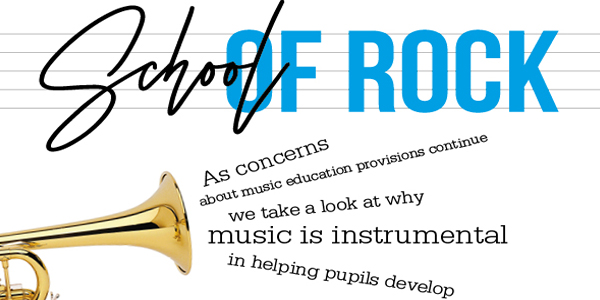School of rock

As concerns about music education provisions continue we take a look at why music is instrumental in helping pupils develop.
Ask a group of adults to list their regrets and you can bet that at least one of them will cite not learning an instrument. Giving up those piano lessons because you wanted to play out instead, packing up the guitar because it was too difficult or never even trying to play an instrument at all – we’ve all been there. And it seems the next generation haven’t learnt from our mistakes.
According to official figures only one in 20 students took GCSE Music in 2017 and researchers have warned music as a secondary school subject could face “extinction”.
But is this really just a result of disinterest on the part of pupils? Or is there another issue at play? For many experts and commentators, changes to the curriculum and pressures on funding are behind the decline.
A survey of 650 state school teachers, by Sussex University, found the general consensus is that music is being squeezed because of pressure on pupils to take subjects included in the EBacc school league table measure.
Duncan Mackrill, a senior lecturer in education at the University of Sussex, said: “Our research clearly shows the EBacc is having a detrimental effect on the uptake of music in state secondary schools. We also have evidence that the EBacc policy has resulted in a negative impact on the wider musical life of schools as well as curriculum provision.”
Meanwhile, a BBC survey found nine in every 10 schools have had cut back on lesson time, staff or facilities in at least one creative arts subject (including music).
“The Performing Arts and in particular the learning of a musical instrument have typically played a relatively unimportant role in British schools over the past few decades,” says Andrew Byers, director of music, St. Mary’s College, Crosby. “Due to increasing financial constraints set upon the majority of schools and councils around Britain, music teachers have tried to protect and strengthen the position of music in primary and secondary schools.”
THE POWER OF MUSIC
The cuts to music provisions across UK schools is all the more concerning when one considers how important the subject is.
Various studies and reports have been published, in particular in the USA that have led music educators to argue that learning a musical instrument supports the academic progression of students in their other subjects.
“The disciplines needed to learn a musical instrument are clear; patience, determination, dexterity, perseverance and emotional control are the obvious ones, but we must add to that the cognitive processes of perception, memory, evaluation, problem solving, reasoning and the production of a new ‘language,” says Andrew.
At St. Mary’s College, all pupils learn a musical instrument from Year 4 at its Preparatory School and from Year 7 at the College. All symphonic and wind band instruments are on offer, (including the “lesser popular Bassoon and Double Bass” says Andrew).
St Cuthbert’s in St Helens is another school which recognises the value in music.
“At St Cuthberts we value music at the same level as any other subject,” says music teacher Dave Conlan. “It continues at both KS3 and 4 and there are many extracurricular opportunities on offer to all students and if there is a financial constraint we strive to ensure that all our young people have the opportunity. As a Catholic school we value music throughout school at assemblies and celebrating mass at school, dance and music festivals.”
Dave says the younger a child starts to appreciate music the easier it will be in older children. “However age should not be a barrier as we have seen many of our young people take up an instrument in secondary school as a way of complimenting their studies and helping their general well being,” he says. “All [of our pupils] are given the same opportunities and we encourage all instruments to be experienced. We have a rock band, a choir and a ukulele band to name but a few.”
Darren Henley OBE, chief executive of Arts Council England has voiced his support for more music in schools on several occasions.
He says: “Schools across the country seek to provide high quality music education for a whole host of reasons. Advocates of music education will often cite the subject’s contribution to a school’s ethos, its positive impact on attainment in other subjects, its role in developing social skills and the opportunity for self-expression. All of these are important points that should be taken into consideration. More than anything, however, music should be a part of children’s schooling for its own intrinsic good.”
COGNITIVE DEVELOPMENT
There have been countless studies into the links between learning a music instrument and improving brain function. Indeed, it’s no surprise that from as young as a few months old parents are encouraged to help their little ones engage with musical instruments.
As parenting website Babybrain.co.uk puts it: ”Playing an instrument requires good motor skills, both gross and fine. A baby bashing on a drum or shaking a rattle is an example of gross skills and more fine skills might come with pressing a key on a keyboard, or accurately hitting a note on a xylophone. Playing an instrument might also improve control and coordination skills in older children.”
And the benefits continue as children age and begin to take music more seriously.
“The ability to ‘split your brain’ and ask it to perform numerous functions simultaneously (multitasking) takes time,” says Andrew. “The process of learning the piano, with two hands playing independent parts, whilst reading music notation and listening to the immediate outcome, challenges and explores the capacity of the human brain”.
DEVELOPING DISCIPLINE
Anyone who has attempted to learn to play an instrument know it takes an awful lot of dedication to succeed – the type of dedication that is needed in many other aspects of life such from studying for exams to progressing in your chosen career.
“Learning to play an instrument of any kind is an excellent way of developing discipline through enjoyment,” says Dave. If the pupil is able to see the results of their dedication they’ll be keen to continue.
STRESS RELIEVER
Education provider Kumon says music teaches pupils to focus and relieves stress.
“Playing an instrument or being in a musical class demands total attention,” it says. “Because of this, music is a great stress-relieving tool that helps to calm the mind and enhance concentration.”
Jess D’Silva, Director of Prelude School of Music adds “Learning and playing music is a great way to focus and relax, which helps combat negative mental health issues. It’s a form of mindfulness which can be transferred to everyday life, especially when you can feel like everything is getting on top of you.”
CULTURAL AWAKENING
St Cuthbert’s Dave says music can also help pupils to develop an understanding of different cultures.
By learning an instrument children are able to explore different types of music stemming from a whole host of different cultures and backgrounds, promoting diversity and a greater understanding of other people.
SELF CONFIDENCE AND SOCIAL SKILLS
According to Kumon, one of the biggest benefits of music is the impact it can have on confidence. “By improving their abilities with a specific instrument and achieving their goals, children can feel very satisfied and this can greatly improve their self-esteem,” it claims. “Taking risks and facing challenges is essential for a child in order to fully develop his or her potential.
“Furthermore, as music is often played in a group, team-work skills are taught so all players work together harmoniously. In order to improve the show, attending rehearsals and practicing is essential too. Working towards a single goal helps to enhance social skills.”



